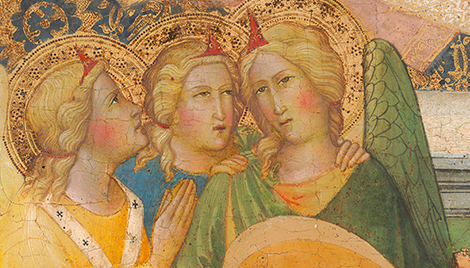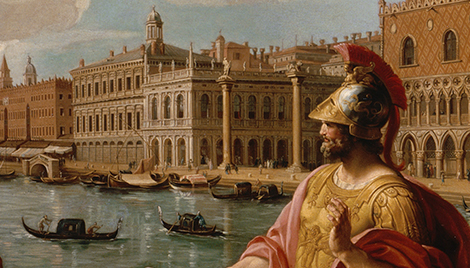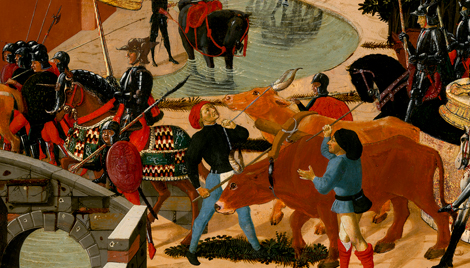Kress Fellow Spotlight: Elizabeth Perkins
Elizabeth Perkins is an Associate Educator at The Metropolitan Museum of Art where she oversees college and university programs, and helps facilitate teaching and learning across The Met’s entire collection. Elizabeth holds a B.A. from Middlebury College, and completed her Ph.D. in art history at Columbia University, specializing in fifteenth- and sixteenth-century Italian art. She was a Kress Interpretive Fellow at The Met in 2012-13.
Her current projects focus on the pedagogy of object-based teaching and learning across disciplines. Elizabeth views teaching as a form of research, and a consistent teaching practice as fundamental to scholarship in both museum education and art history. Her practice is social justice-oriented, and the focus of all her work is to create greater access, equity, and inclusivity in museums.
Read on to hear more about Elizabeth’s work and experience as a Kress Interpretive Fellow, in conversation with Shea Spiller from the Kress Foundation.
Shea Spiller: What is your current position?
Elizabeth Perkins: I'm an Associate Educator at the Metropolitan Museum of Art. I work in Academic Programs with a focus on college and university audiences at the Met, which encompasses our undergraduate and graduate internship programs, and some public programming related to adult learners, students, and faculty.
SS: I’d love to hear more about the Met’s internship program. How many interns do you usually have? And for what length of time?
EP: We have them year-round, with both twelve-month internships as well as ten-week internships in the summer, fall, and spring. Throughout the year we usually have anywhere from 100 to 120 interns that come through our door. We’ve slowly been adding more year-long internships and currently have nine. They’re more specialized within individual departments, whether that be curatorial, conservation, education, or another department.
The Met's Spring 2022 intern cohort
SS: What excites you most about your work?
EP: I started out in academia and really fell in love with teaching and museum education because I realized that for me, the exciting part wasn't just researching and writing about art, it was the interaction of art and people.
I love welcoming people to the Met, especially those who haven't been here before, and seeing them light up when making a new discovery or simply having a moment where they feel content.
I enjoy working with the summer interns in particular. It’s so rewarding to see them grow and become confident in leading their own tours. We provide them with training in pedagogy and visitor engagement, but they write and lead all their own tours. It’s wonderful to see the interns grow confident in their work—that’s one of the best parts of my job.
SS: Can you tell me about a project—past, current, or future—that you're especially proud of or that you think was particularly successful?
EP: I’m very proud of a program I created back in 2017 called Career Insights. It was inspired in part by what my colleagues in Teen Programs were already doing for high school students—a program called Career Labs where they welcome students to the Met and talk with them about career paths in museums. Prior to Career Insights, there wasn’t a clear entry point for college students who weren’t already connected to the Met in some way to talk with staff about their jobs. I wanted to create a free program that targets students who are at a very early exploratory stage of their studies or careers, also including those who are already really interested in museums.
It’s become an annual event that we do in the fall. I recruit about 30 to 40 of my colleagues from across the museum to come and talk to the students about what they do and answer questions. This event not only helps students, it helps our staff—myself included—stay in touch with students, learn what they’re interested in, and see how we can best serve their needs.
SS: You were a Kress Interpretive Fellow at the Met in 2012-2013. Can you tell me about your experience in that program?
EP: It's not an exaggeration to say that the Kress fellowship changed my life and completely altered the trajectory of my career. At the time, I was finishing up my dissertation and was pretty certain that I didn’t want to seek a career in academia. Frankly, I was a feeling little bit lost. But one thing I knew is that I really loved bringing my students to the Met and I wanted to find a way to pivot into museum work where I could work with both objects and people.
The project I worked on during my fellowship at the Met supported the reinstallation of the European paintings galleries at the time. I created an interpretive teaching guide for the European paintings galleries that sought to break from the chronological narrative of European painting. That year was a crash course in museum education and interpretation for me. It really helped me to understand the structure of the museum and to see how these different viewpoints converge in the museum’s interpretive program, combining perspectives from curators, conservators, educators, and more. The experience affirmed that art museums were the place that I wanted to be and that museum education was the field that I wanted to pursue.
View Elizabeth's interpretive guide for the Met's European Paintings galleries on the museum's website.
SS: Where do you see room for innovation and growth in your work and within the field at large that makes you excited about the future of museum education?
EP: One of the things that I'm really excited about is the idea of museums as a site of convening for students, where the museum becomes a space for like-minded students to come together to socialize and learn from each other, not just staff.
My colleagues in Teen Programs already do this very successfully with programs like Teen Fridays, where young people can drop in, hang out, and find something that they’re interested in or meet new friends. I’m trying to do that with college students as well. Currently we have a group called the Met Collective that is an engagement group for students with a love of art and museums to come together and talk with one another about their interests.
I’m excited for those sorts of possibilities and am starting to see that happen in other museums in the U.S. and across the world. My colleague Nora and I recently met with a team at the National Gallery of Singapore that has founded a similar group for college students. It was so exciting to talk about our work and find that, despite the differences in our cultures, we share a very similar set of goals, as well as challenges, in creating communities for students and emerging professionals in our museums. I hope that we can continue to find ways to better support students in using the museum as a site to find and create community.
SS: I think that’s a really beautiful note to end on. Thank you so much for taking the time to speak with me about your work, it’s been a pleasure!
Click here for more information on the Kress Interpretive Fellowships at Art Museums program.



